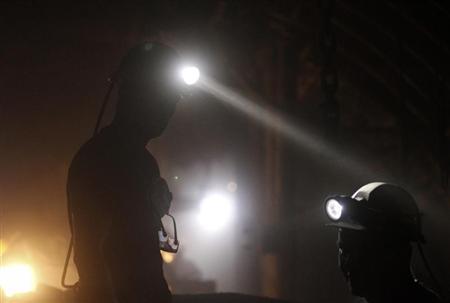Analysis: Poland to get dirtier as it leans towards lignite coal
Date: 01-Aug-13
Country: UK
Author: Agnieszka Barteczko and Henning Gloystein

Miners work in an underground coal mine in Ornontowice, Poland.
Photo: Peter Andrews
Poland, one of the heaviest polluters in Europe, will become even dirtier now that its shale gas ambitions have faded and it turns to cheap domestic lignite coal to secure its energy supply.
Poland already relies on coal to produce more than 90 percent of its electricity and is home to the European installation that emits the most carbon dioxide - utility PGE's lignite power plant in Belchatow.
Its choice of fuel now could determine its energy and environmental situation for decades to come, given that Poland needs to build new power stations to replace ageing plants and cope with future demand as its power system operates close to capacity.
The government and utilities, encouraged by firm popular support, are looking to domestic lignite reserves as a cheap way to fuel that new capacity and reduce imports of Russian gas.
"Looking at Poland's limited reserves of gas and oil, lignite coal has to be perceived as the stabilizing factor for Poland's energy safety," Poland's economy ministry said in an email, adding Poland's lignite reserves will last for 200 to 300 years.
Poland had aspired to become Europe's main producer of cleaner shale gas, but its ambitions for a U.S.-style boom were thwarted when estimates of its shale gas reserves were slashed by over 90 percent.
Potential shale investors including Exxon Mobil, Marathon Oil and Talisman Energy quit Poland, which then set its sights on boosting lignite production.
Lignite is a soft brown fuel, considered to be the lowest and cheapest grade with a carbon content of around 25-35 percent.
"Lignite is the cheapest fuel at the moment. Moreover, its price is the most stable and predictable compared to hard coal, gas or oil. I think lignite is becoming Poland's raison d'état," said Zbigniew Bryja, the head of ZE PAK's mining unit.
Warsaw-listed ZE PAK is Poland's second-largest lignite power producer, and the company has an exploration license for a part of a lignite field whose potential reserves together with smaller neighboring fields total 3 billion tones, more than Poland's total lignite output since World War Two.
KING COAL
Environmental groups worry that the newly discovered appetite for lignite will make Poland even dirtier. Poland's emissions already exceed Spain's even though its population and economy are smaller.
"If all these projects kick off, Poland will become even more polluted," said Michal Wilczynski, Poland's former chief geologist.
State-controlled PGE, Poland's biggest utility, plans a couple of new lignite projects including a power plant in Turow, with the lignite fields in Legnica as a potential fuel source.
Power production at lignite plants in Poland already increased by 3.7 percent year-on-year in 2012, while hard coal-fired plants lowered their output by almost 7 percent, data from Polish grid operator PSE shows.
Poland still managed to reduce its CO2 emissions by 5 percent last year, according to Eurostat, due to low demand for power in a sluggish economy and through adding renewable power capacity.
Renewables require expensive state subsidies, however, and the costs of developing new nuclear power stations have been spiraling.
Polish utilities want to curb spending at a time of weak economic growth that has dented wholesale power prices, and lignite is their cheapest fuel by far.
"Lignite costs some 6.5 zlotys ($2.05) per gigajoule and hard coal 10 to 11 zlotys," said Maciej Hebda, equity analyst at Espirito Santo.
The European Union has set a target of cutting carbon emissions across the 28-nation bloc by 20 percent from 1990 levels by 2020. Poland could risk financial penalties imposed by Brussels should it miss these targets because of a lignite boom.
But the EU's Emissions Trading System currently provides little financial incentive for utilities across Europe to stop burning coal. EU carbon permits have lost over half their value over the past year and are now worth under 5 euros a tone.
The scheme forces utilities to buy a permit for each tone of carbon dioxide they emit. Carbon permits would have to cost around 45 euros to make burning natural gas more profitable for them than imported hard coal. Lignite coal sourced domestically would require an even higher carbon price.
The role of lignite in Poland's energy mix will be defined in its new energy policy to 2050, to be published by the end of this year. That role will depend on the development of renewables and nuclear energy and the opening of new coal mines.
"Lignite will stay," said Pawel Smolen, head of the European Association for Coal and Lignite and former PGE management board member.
"I definitely believe in lignite in countries like Poland ... because you have open cast mines in place," he added.
($1 = 3.1773 Polish zlotys)
(Additional reporting by Nerijus Adomaitis; Editing by Nina Chestney and Jane Baird)
![]()
© Thomson Reuters 2013 All rights reserved